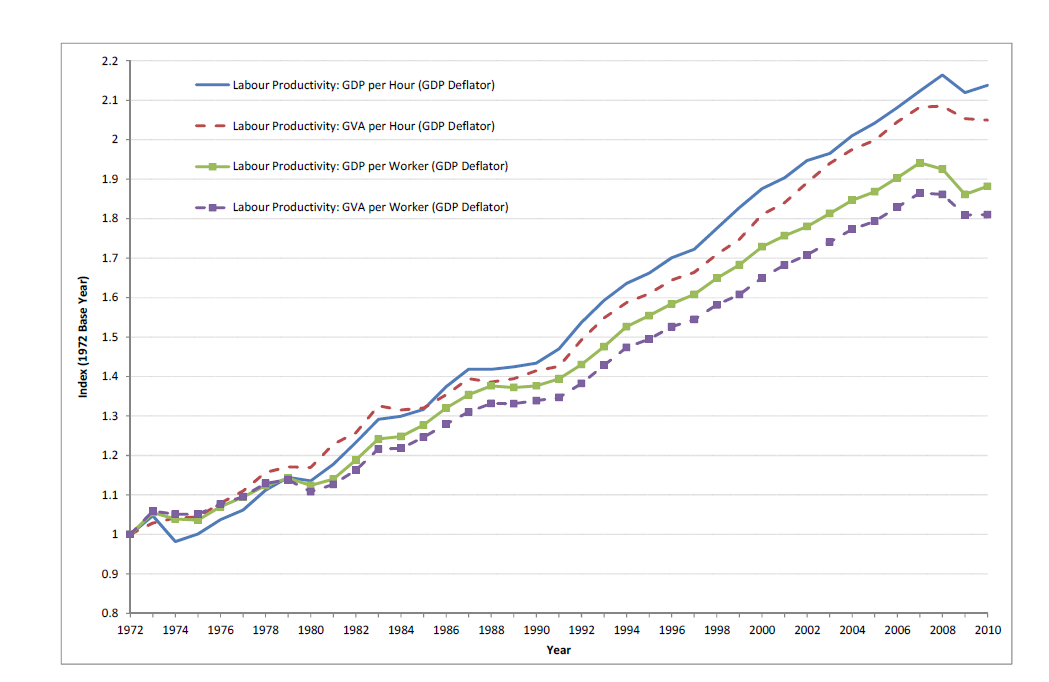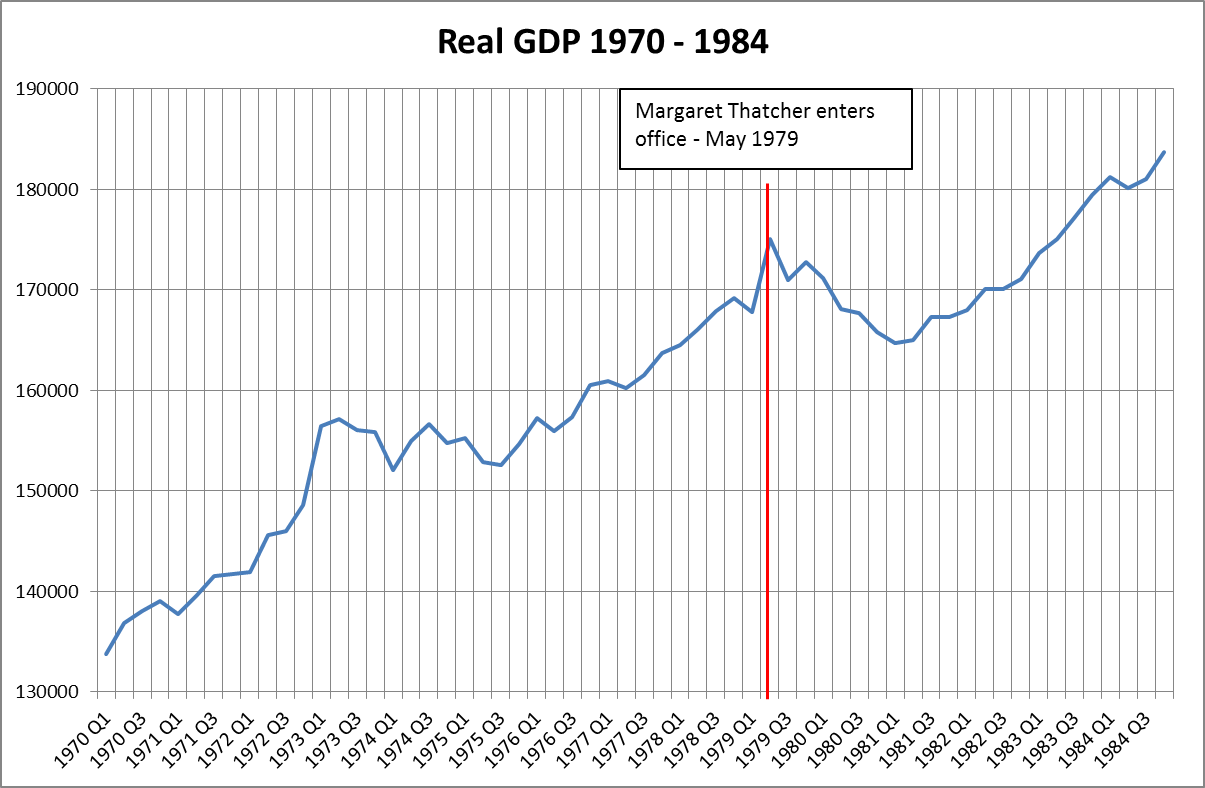As Kawan Patel suggested on LabourList a few days ago, New Labour was founded on the idea that while Margaret Thatcher might not have ‘saved the nation’ as her Conservative supporters claim, there were things she ‘got right’. I believe that this focus on the specifics of the Thatcherite legacy, such as privatisation and reductions in union power, is wrong. It is what was entirely responsible for New Labour’s failure to reverse inequality and for allowing a massive financial bubble to replace a sustainable industrial infrastructure in Britain. We must learn this lesson.
For a start, the image of 1970s Labour government in hapless thrall to left-wing union leaders leading their unwilling rank-and-file members to destroy the British economy is almost entirely a creation of the press and Conservative myth-makers. The root cause of the industrial unrest of the 1970s that culminated in the ‘Winter of Discontent’ of 1978-79 was consistent annual inflation in double digits. This was mainly as a consequence of massive hikes in the price of oil. Firms showed no restraint in allowing their prices to rise to maintain their profits; for workers to maintain their standards of living required credible threats to withdraw labour. In doing this they were, on average, successful – but no more than that. In relation to labour productivity, hourly wages were at exactly the same point in 1979 as they had been in 1972.

There were a record number of days lost to labour disputes in 1979, yet this amounted to only just over one day per worker. These disputes were often unofficial, initiated by local militants or groups of workers whose earnings were low, as they are today, despite the importance or unpleasant conditions of their jobs. They were not in general the consequence of ‘union barons’ seeking to usurp the government of the day. While causing inconvenience, sometimes unpleasantly so, industrial action did not even have a significant effect on the economy as a whole. National output fell slightly in the first quarter of 1979, after what was in any case a harsh winter. But it roared back in the second quarter of that year to be bang on the rising trend for the decade as Mrs Thatcher first took office. And this was to be its peak until the second quarter of 1983, by which time unemployment had doubled. In economic terms, far from saving the nation, Mrs Thatcher’s government appears to have laid waste to it! Yet, thanks to the Falklands war and the UK electoral system, this same government was returned to office that year with a huge majority on only 42% of the popular vote.

Cherry-picking policies that seemed ‘to work’, whether Thatcherite in origin or more social democratic, without an overarching understanding and commitment, is precisely what led New Labour to ultimate failure. Thatcherism was much clearer. We can see this in a recent quote from the Margaret Thatcher Foundation for Freedom’s senior research fellow:
There was never any reason to believe that governments – which are just small collections of individuals – would have the necessary wisdom to make better decisions than the market – a much larger collection of individuals.
This is pure Friedrich Hayek, and pure nonsense as an approach to economic governance in a properly-functioning democracy, but it served well in guiding the Conservatives toward their chosen constituency. The case for markets is twofold: firstly free exchange of goods and services is fulfilling in its own right; secondly under certain circumstances the distributions that result from free exchange cannot be unequivocally bettered. These circumstances are quite restrictive: equality of initial resources and access to the market, complete information about the goods and services exchanged and clearly-formed preferences. They sound unrealistic and they are – so, most of the time, to let the market decide is as much as a decision by government as to try to adjust or over-ride its outcome. Moreover, a government is only ‘a small collection of individuals’ in a dictatorship (whether of an elite based on political or economic power). An effective democracy, to a greater or lesser extent, involves all who vote or express an opinion that reaches policymakers – almost all those in fact who take part in the market. What is more, each individual has, in principle, equal weight in this process, whereas weighting in the market always occurs by wealth. If we want better economic outcomes, therefore, we should look at least as much to improvements in the way democratic processes balance individual and collective voices as to ways of mimicking market mechanisms.
The lessons Labour should learn from the Thatcher experience are not specifics to do with trade union power or privatisation but more general lessons. Unbuffered fanaticism is dangerous for society and the economy, and while the market should certainly be embraced it can have no automatic primacy for determining fair, or even efficient, outcomes. In policy terms this means improving the workings of democracy to widen the range of voices heard, being clear about the merits and limits of markets, and being willing to make intelligent and informed interventions where these limits bind.
3 replies on “Thatcher and Labour: The Real Lesson”
[…] Dr. D has a new post up with regard to Thatcher. I lived through the Thatcher years, I left school just after she was elected in 1979. I always had a love/hate relationship with her policies. Would I vote for her today? Yes, I think I would. There was never any reason to believe that governments – which are just small collections of individuals – would have the necessary wisdom to make better decisions than the market – a much larger collection of individuals. […]
A response from ducati998 and my reply.
I said:
ducati998 said:
I said:
he said:
I said:
he said:
Prices can be discounted for known risk, they cannot be (usefully) discounted for lack of information – particularly if that lack goes unrecognised! We are dealing with Knightian or Keynesian uncertainty here. I don’t quite see how specialisation in production can overcome a lack of resources to produce or exchange. If preferences are irrational, changed by social or market interaction or are time inconsistent then the theoretical total welfare superiority of market outcomes disappears. For that reason, by ‘favouring’ market outcomes, the government is favouring those groups who tend to benfit from market distortions as opposed to those who benefit from government ‘distortions’.
I said:
he said:
I said:
he said:
I said:
he said:
I don’t believe democracy is so monolithic – it certainly needn’t be. Less centralisation, more responsiveness should be the aim. Demand depends on having the resources (i.e.: wealth) to exercise it.
“Firms showed no restraint in allowing their prices to rise to maintain their profits…” That’s not supported the chart (link below) which shows wages taking an all time record share of GDP in 1974,5 & 6, with profits taking a correspondingly small share. As to 1977,8 & 9, profits recovered to a more normal level. But there is no evidence of “no restraint”.
http://stumblingandmumbling.typepad.com/stumbling_and_mumbling/2012/12/on-wage-and-profit-shares.html